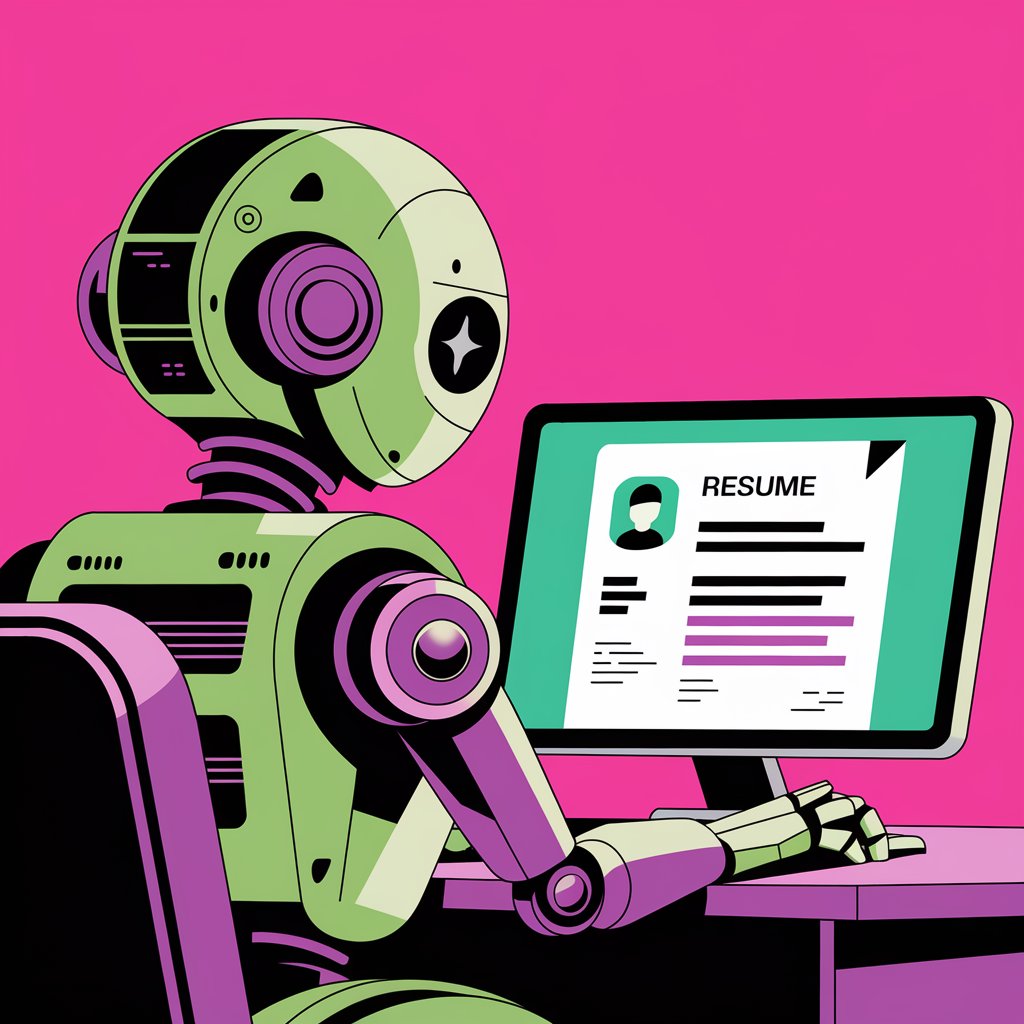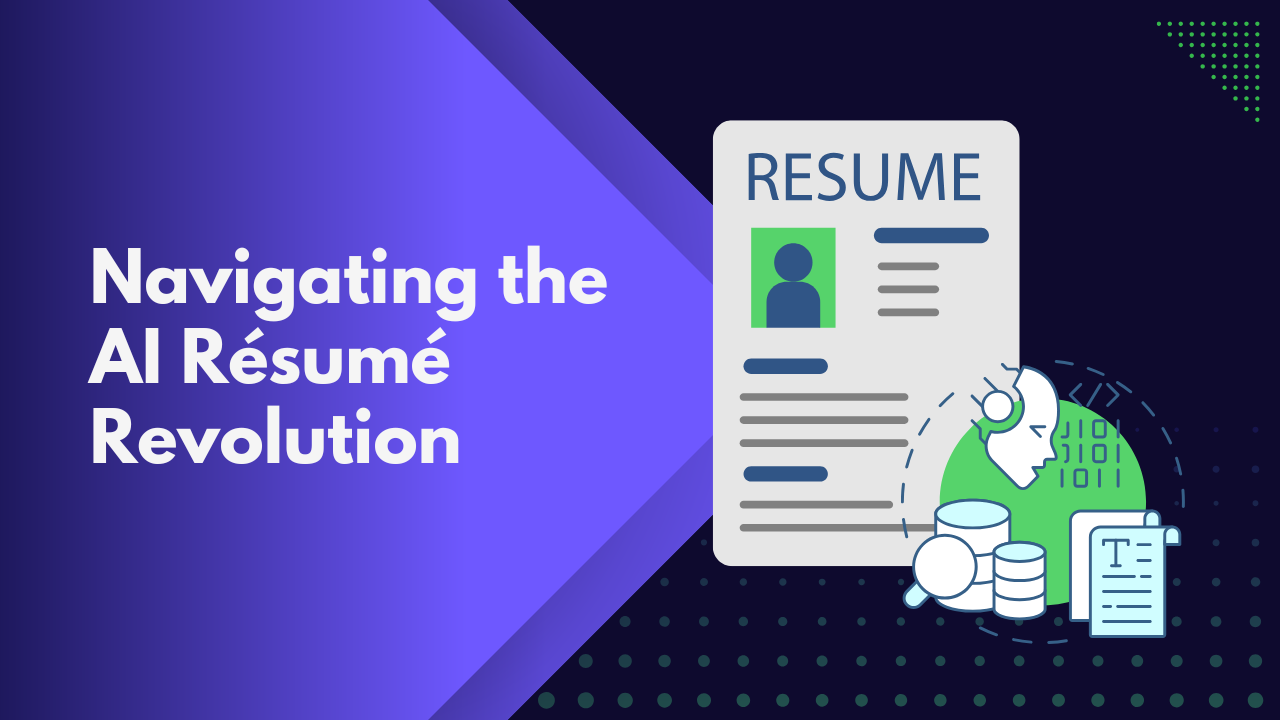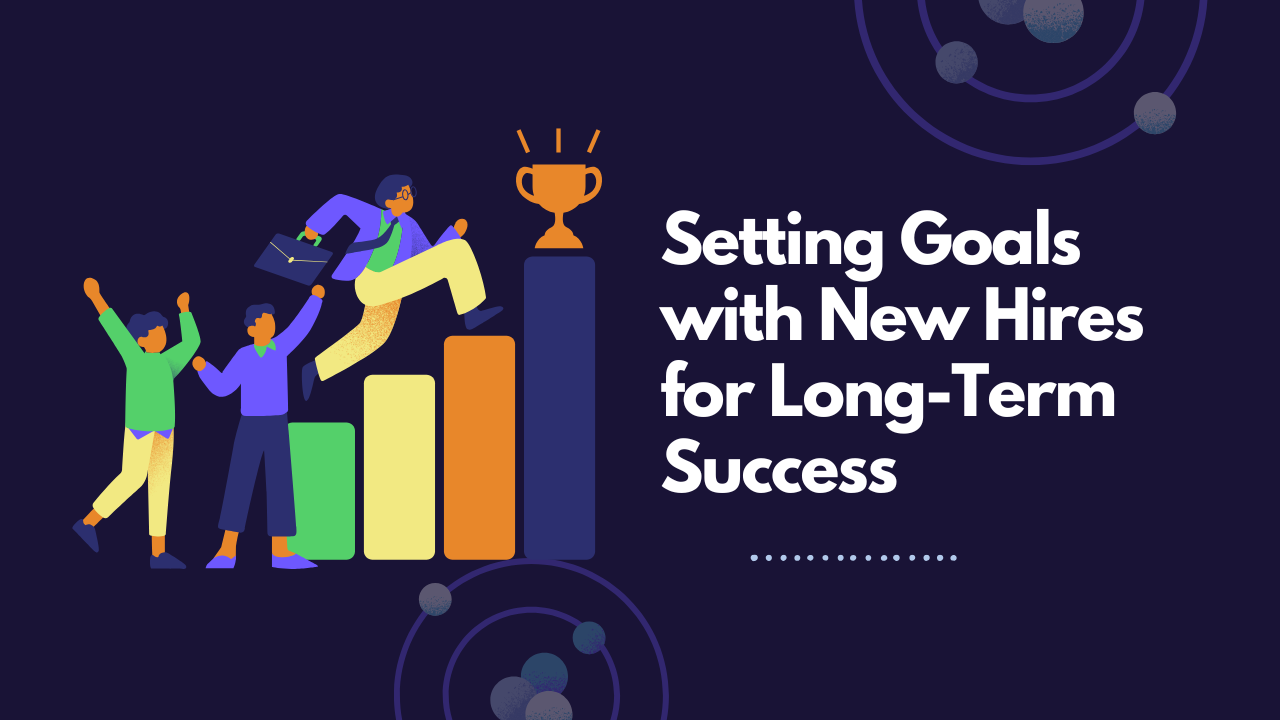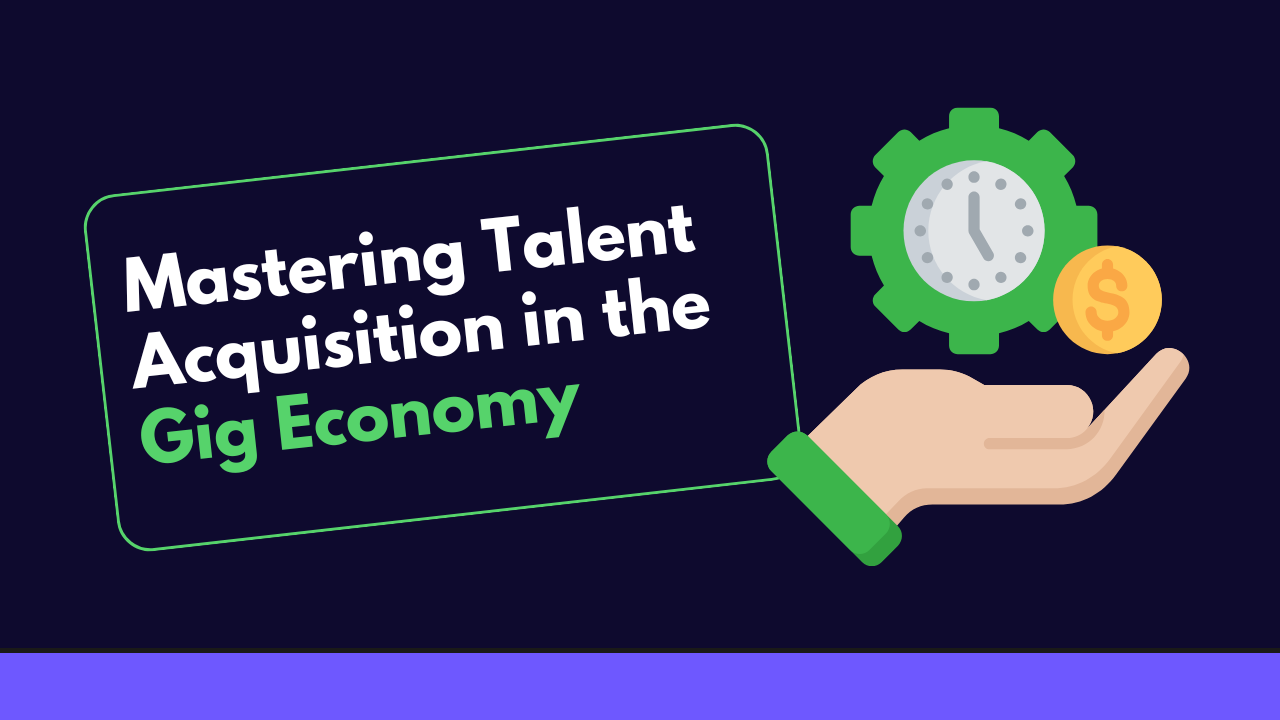The rise of AI-powered resume builders has revolutionized the job application process, empowering job seekers to craft polished and compelling resumes quickly. While this offers advantages for candidates, it presents a new set of challenges for recruiters navigating a landscape of increasingly sophisticated, AI-crafted resumes. This post explores the growing trend of AI-generated resumes, examines the hurdles it creates for hiring managers, and offers practical strategies for effective vetting in this new era of recruitment.
We’ll delve into the potential pitfalls of over-polished applications, discuss the increasing volume of AI-tailored resumes, and address the inherent risks of bias. Furthermore, we’ll equip you with actionable solutions, from enhanced screening processes and structured interviews to emphasizing soft skills and leveraging AI tools ethically. Join us as we navigate the AI resume revolution and discover how to find the right talent while maintaining the crucial human touch in your hiring process.
The Rise of AI-Crafted Résumés
The use of AI tools for résumé creation is rapidly increasing, transforming how job seekers present themselves to potential employers. This presents both opportunities and challenges for recruiters navigating the modern job market. This section explores the growing trend of AI-crafted résumés, examining how these tools are used and the implications for the hiring process.
AI Résumé Builders: A Game Changer for Job Seekers
AI résumé builders, like ChatGPT and specialized tools such as ResumeWorded and Jobscan, are empowering job seekers to create polished and compelling applications quickly. These tools leverage natural language processing and machine learning to optimize résumé language, highlight achievements, and tailor applications to specific job descriptions. A study by ResumeWorded found that AI-optimized résumés received 2.5 times more interview callbacks. This demonstrates the significant impact AI is having on the job application process.
These tools can be particularly helpful for individuals who struggle with writing or lack the time to craft a compelling résumé from scratch. They can also ensure consistency in formatting and language, increasing the likelihood of a résumé passing through Applicant Tracking Systems (ATS).
The Flood of Similar Résumés: A Challenge for Recruiters
While AI résumé builders offer advantages for job seekers, they present a significant challenge for recruiters. One of the most pressing issues is the increasing number of similar résumés flooding the market. As more candidates utilize these tools, recruiters are faced with a surge of highly tailored, yet often generic, applications. This makes it more difficult to differentiate between candidates and identify those who truly possess the required skills and experience.
This influx of similar résumés can lead to recruiter fatigue and increase the time spent on initial screening. The challenge lies in distinguishing authentic experience from AI-generated embellishments. This requires recruiters to adapt their strategies and develop new methods for effectively evaluating candidates in the age of AI.
The Blurring Lines Between Authenticity and Embellishment
AI-powered résumé tools can sometimes exaggerate skills or experiences. This makes it difficult for recruiters to discern genuine expertise from AI-crafted narratives. For instance, an AI tool might rephrase a simple task as a significant accomplishment, creating a misleading impression of a candidate’s capabilities. This blurring of lines necessitates a more discerning approach to résumé review, focusing on verifiable accomplishments and concrete examples.
The use of AI in résumé creation also raises concerns about the authenticity of the application. While the tools help present information in a polished manner, the actual content may lack the genuine voice and personality of the candidate. This can hinder the recruiter’s ability to assess cultural fit and other essential qualities that are not easily conveyed through AI-generated text. Therefore, recruiters must prioritize methods that go beyond the résumé to assess a candidate’s true potential.

Challenges for Recruiters
Navigating the influx of AI-crafted résumés presents several key challenges for recruiters. These challenges demand a shift in traditional recruitment strategies and a deeper understanding of how to effectively evaluate candidates in the age of AI.
Over-Polished Applications: Discerning Reality from Embellishment
AI résumé builders excel at crafting polished and impressive-sounding descriptions of skills and experiences. This often leads to over-polished applications where a simple task might be rephrased as a major accomplishment. For example, “Managed a team of interns” could become “Spearheaded a cross-functional team to achieve a 15% increase in productivity.” This embellishment makes it difficult for recruiters to differentiate genuine expertise from AI-generated narratives. A study by CareerBuilder found that 58% of hiring managers have caught lies on resumes. While not all AI-generated content is fabricated, the potential for exaggeration requires recruiters to develop a more discerning eye.
This challenge necessitates a more in-depth approach to résumé review. Recruiters must focus on verifiable accomplishments and concrete examples rather than relying solely on impressive-sounding descriptions. Asking candidates to elaborate on specific projects and quantify their contributions can help separate genuine expertise from AI-generated hype.
Volume Overload: The Deluge of Similar Résumés
As AI résumé tools become more accessible, recruiters face a significant increase in the sheer volume of applications. This influx isn’t just about numbers; it’s about the similarity of the résumés themselves. AI-powered tools often produce highly tailored applications that adhere to specific job descriptions. While this seems advantageous on the surface, it leads to a flood of near-identical résumés, making it harder to differentiate candidates. This can overwhelm recruiters and significantly increase the time spent on initial screening. Imagine sifting through hundreds of resumes that all use the same keywords and structure. This “sea of sameness” makes it challenging to identify truly exceptional candidates.
Recruiters must adapt their strategies to manage this volume overload. Leveraging AI-powered screening tools to filter based on specific criteria can help. However, it’s crucial to balance automation with human oversight to avoid overlooking promising individuals who might not perfectly match the algorithm’s parameters.
Bias Risk: Addressing Algorithmic Discrimination
AI algorithms learn from the data they are trained on. If this data reflects existing biases, the AI tool may unintentionally perpetuate or even amplify those biases in the hiring process. For example, if an AI is trained on data that predominantly features male CEOs, it might unfairly favor male candidates for leadership positions. This algorithmic discrimination poses a serious ethical challenge for recruiters. A 2019 study by the National Bureau of Economic Research found that resume screening software can discriminate against minority applicants. This emphasizes the need for careful evaluation and mitigation of bias in AI hiring tools.
Recruiters must actively address this bias risk by carefully vetting AI tools, ensuring they are trained on diverse datasets and regularly auditing their performance for fairness. Promoting diversity and inclusion in the hiring process is not just an ethical imperative, but also a business advantage. A diverse workforce brings a wider range of perspectives and skills, leading to increased innovation and better business outcomes. Recruiters should prioritize AI tools that offer transparency and explainability in their decision-making processes, allowing for better identification and mitigation of potential bias.
Strategies for Effective Vetting
The increasing prevalence of AI-crafted résumés necessitates a shift in traditional recruitment strategies. Recruiters must adopt new methods to effectively evaluate candidates and identify genuine talent in the age of AI. This section outlines key strategies for navigating this evolving landscape.
Enhanced Screening Processes
Traditional screening methods may no longer suffice in identifying the true capabilities of candidates using AI-powered résumé builders. Recruiters need to enhance their screening processes to effectively filter through the influx of AI-generated applications.
Leveraging AI Detection Tools
Applicant Tracking Systems (ATS) with AI detection capabilities can help identify patterns and similarities common in AI-generated résumés. These tools can flag potentially embellished or generic content, allowing recruiters to focus their attention on applications that demonstrate genuine individuality and experience. Several ATS providers are now incorporating features specifically designed to detect AI-generated text. This technology helps level the playing field and ensures a fairer evaluation process.
Cross-Referencing with Online Profiles
Inconsistencies between a résumé and a candidate’s online presence, such as their LinkedIn profile, can be a red flag. Cross-referencing information can help recruiters verify the accuracy and authenticity of the claims presented in the résumé. For example, if a résumé highlights extensive project leadership experience not reflected on LinkedIn, it warrants further investigation. This simple step can significantly enhance the accuracy of candidate assessments.
Structured Interviews
While résumés provide an overview of a candidate’s qualifications, structured interviews are crucial for delving deeper into their actual experience and assessing their fit for the role.
Behavioral and Situational Questions
Focusing on behavioral and situational questions can help assess a candidate’s actual experience and problem-solving skills. These questions prompt candidates to describe how they handled specific situations in the past, providing insights into their decision-making process and behavior under pressure. Examples include: “Describe a time you faced a challenging project deadline” or “Tell me about a time you had to resolve a conflict within a team.”
Skill-Based Tests and Assignments
Incorporating skill-based tests or assignments relevant to the role allows recruiters to evaluate a candidate’s practical abilities. These assessments provide direct evidence of a candidate’s skills, bypassing the potential for embellishment in AI-generated résumés. For technical roles, coding challenges or data analysis tasks can be highly effective. For marketing positions, a content creation assignment can be valuable.
Evaluating Soft Skills
AI-powered résumé tools may effectively highlight technical skills and achievements, but they often struggle to convey essential soft skills. Recruiters must prioritize these nuanced qualities, which are crucial for success in most roles.
Emphasizing Interpersonal Skills
Focus on assessing interpersonal skills, such as communication, teamwork, and adaptability. These qualities are difficult to quantify and are often less emphasized in AI-generated résumés. Include questions that explore a candidate’s ability to collaborate, handle feedback, and navigate complex interpersonal dynamics. Observing a candidate’s interactions during the interview process also provides valuable insights into their soft skills.
Assessing Cultural Fit
Evaluating cultural fit is crucial for long-term employee success and team cohesion. While AI can analyze skills, it cannot accurately assess whether a candidate’s personality and values align with the company culture. Incorporate questions that explore a candidate’s work style, preferences, and values to gauge their potential fit within the organization. Sharing insights into the company culture during the interview process allows candidates to assess their own alignment.
Leveraging AI Without Losing the Human Touch
The increasing use of AI in resume creation necessitates a shift in how recruiters approach the hiring process. While AI offers powerful tools for streamlining and enhancing various stages, the human element remains crucial for effective talent acquisition. This section explores how recruiters can leverage AI’s capabilities without sacrificing the essential human touch that ensures the best hiring decisions.
AI as a Recruiter’s Assistant
Recruiters can utilize AI tools to streamline time-consuming tasks, freeing up valuable time to focus on higher-level aspects of the hiring process. AI can assist with:
-
Initial Screening: AI-powered Applicant Tracking Systems (ATS) can efficiently filter resumes based on predefined criteria, significantly reducing the manual effort required for initial screening. This automation allows recruiters to quickly identify candidates who meet the basic requirements of the role.
-
Candidate Sourcing: AI algorithms can analyze vast databases of online profiles to identify potential candidates who might not actively be seeking new opportunities. This proactive approach expands the talent pool and helps recruiters discover hidden gems. Platforms like TapTalent, with access to a database of 800 million+ professionals, exemplify this capability.
-
Scheduling and Communication: AI-powered chatbots can automate scheduling interviews, sending reminders, and answering frequently asked questions from candidates. This automation enhances the candidate experience and reduces administrative burden on recruiters.
-
Market Analysis: AI can analyze salary trends, skill demands, and competitor activities, providing valuable insights for recruiters to make informed decisions about compensation and talent acquisition strategies.
The Indispensable Human Element
While AI can significantly enhance efficiency, certain aspects of the hiring process require the nuanced judgment and empathy that only humans can provide. These include:
-
Evaluating Soft Skills: AI struggles to accurately assess crucial soft skills like communication, teamwork, adaptability, and critical thinking. These qualities are best evaluated through structured interviews, behavioral questions, and carefully observing candidate interactions.
-
Assessing Cultural Fit: While AI can analyze skills and experience, it cannot determine whether a candidate’s personality and values align with the company culture. Recruiters play a vital role in assessing cultural fit through conversations and evaluating a candidate’s overall demeanor and approach.
-
Building Relationships: Establishing rapport with candidates and building relationships are essential for attracting top talent. The human touch in communication and interactions creates a positive candidate experience and fosters trust throughout the hiring process.
-
Handling Complex Situations: AI algorithms may falter when faced with unique or unforeseen circumstances. Human judgment and problem-solving skills are essential for navigating complex situations, handling sensitive issues, and making informed decisions that consider the individual context of each candidate.
Building Trust in the Hiring Process
Transparency and open communication are crucial for building trust with candidates in the age of AI-driven recruitment. This section explores how recruiters can foster trust by being upfront about the use of AI in their hiring processes.
Informing Candidates
Clearly communicating how AI is used in the selection process helps candidates understand the steps involved and reduces potential anxieties about automated decision-making. Explain which stages utilize AI, such as initial screening or skills assessment, and how human oversight is incorporated to ensure fairness and accuracy.
Emphasizing Authenticity
Encourage candidates to present their authentic selves throughout the process. While AI-powered resume builders offer advantages, genuine personality and individual voice are essential for making a lasting impression. Highlight the importance of honest and accurate representations of skills and experience.
Providing Feedback
Offer constructive feedback to candidates, even those who are not selected for the role. Explain the reasons for the decision and offer suggestions for improvement. This feedback demonstrates respect for candidates’ time and effort and contributes to a positive overall experience.
By combining the efficiency of AI with the irreplaceable human element, recruiters can navigate the evolving landscape of talent acquisition and build a workforce that thrives in the age of AI. This balanced approach ensures that hiring decisions are not only data-driven but also reflect the nuanced qualities that contribute to long-term success.
Embracing the Future of Recruitment
The rise of AI-powered resume builders presents both exciting opportunities and unique challenges for recruiters. We’ve explored the impact of AI-crafted resumes, the hurdles they create, and practical strategies for navigating this new era of recruitment. Remember the key takeaways:
-
Verify, don’t just trust: Cross-referencing resumes with online profiles and using AI detection tools can help distinguish genuine experience from AI-generated embellishments.
-
Go beyond the resume: Structured interviews with behavioral questions and skill-based tests are crucial for evaluating true capabilities.
-
The human touch matters: Soft skills and cultural fit remain essential, requiring human judgment and interaction.
Don’t get left behind in the AI resume revolution. Start your free trial of TapTalent.ai today and experience the power of AI-driven candidate sourcing and matching!




